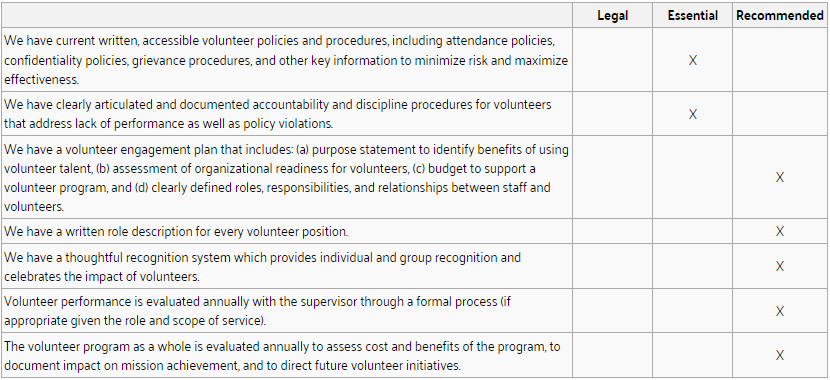Guidelines and Principles: Volunteer Engagement
A volunteer network extends your organization’s reach.
12 Major Areas of Nonprofit Management
Effective volunteer engagement is critical to the success of a nonprofit. The time, talent and treasure provided by volunteers help an organization maximize results in working toward its mission. Nonprofit organizations should exercise fair and equitable volunteer management practices that attract and retain qualified individuals. An effectively-managed volunteer program can build an organization’s efficiency, enhance community engagement, provide specialized expertise and increase the community’s awareness of issues and resources through a knowledgeable pool of ambassadors and donors.
Assessment Items
Onboarding

Policies

Resources
- Independent Sector: Value of Volunteer Time
- Independent Sector: Value of Volunteer Time - By State (2001 - 2018)
- GrantSpace: What is the monetary value of volunteer time?
- Philanthropy.com Time is Money: How to Measure the Value of Volunteers
- Track it Forward: How to Use Volunteer Hours to Get Grants and Amplify Your Impact
- Philanthropy News Digest: Value of Volunteer Time Rose 3% in 2018
- Nolo: How Nonprofits Can Calculate and Report Volunteer Time in Their Financials
Best Practices
Onboarding
- Volunteer assignments are made with careful consideration of the volunteer’s skills, needs, and interests.
- Listen to your volunteers. Ask them how the programs are going, how clients are feeling, what general community members are saying. Ask them how they’re feeling about their work, if they feel valued, if they understand their role in achieving mission. They will be the first to let you know what works, and what doesn’t.
Policies
- Design your volunteer management and support systems to meet the scope of your volunteer involvement. Strategies may be different for one-time, episodic or short-term volunteers than for long-term, ongoing volunteer projects.
- The depth of volunteer performance evaluations should be appropriate to the role and scope of service the volunteer provides. One-time (or episodic) volunteers should be evaluated in much less detail.
- Build collaborative relationships with other programs/organizations similar to yours; consider sharing recruitment, training, and recognition activities.
- When reporting volunteer impact to funders, the community at large and your internal constituents, make sure to factor in the established value of a volunteer hour. https://independentsector.org/value-of-volunteer-time-2018/
